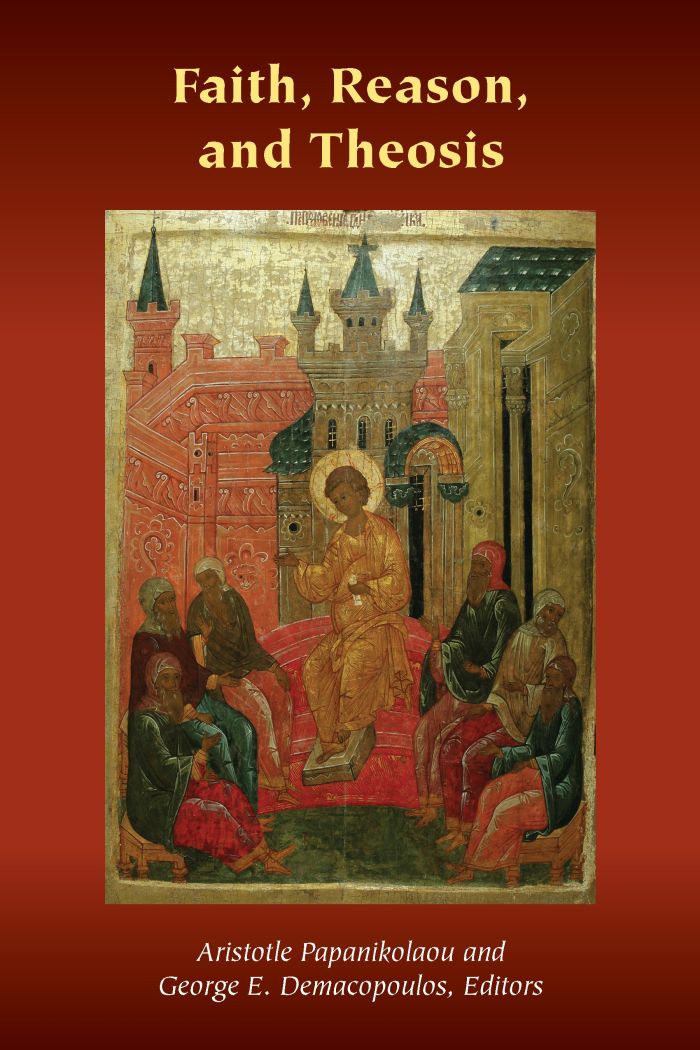Faith, Reason, and Theosis

This book can be opened with

Theosis shapes contemporary Orthodox theology in two ways: positively and negatively. In the positive sense, contemporary Orthodox theologians made theosis the thread that bound together the various aspects of theology in a coherent whole and also interpreted patristic texts, which experienced a renaissance in the twentieth century, even in Orthodox theology. In the negative sense, contemporary theologians used theosis as a triumphalistic club to beat down Catholic and Protestant Christians, claiming that they rejected theosis in favor of either a rationalistic or fideistic approach to Christian life.
The essays collected in this volume move beyond this East–West divide by examining the relation between faith, reason, and theosis from Orthodox, Catholic, and Protestant perspectives. A variety of themes are addressed, such as the nature–grace debate and the relation of philosophy to theology, through engagement with such diverse thinkers as Thomas Aquinas, John Wesley, Meister Eckhart, Dionysius the Areopagite, Symeon the New Theologian, Panayiotis Nellas, Vladimir Lossky, Martin Luther, Martin Heidegger, Sergius Bulgakov, John of the Cross, Delores Williams, Evagrius of Pontus, and Hans Urs von Balthasar. The essays in this book are situated within a current thinking on theosis that consists of a common, albeit minimalist, affirmation amidst the flow of differences. The authors in this volume contribute to the historical theological task of complicating the contemporary Orthodox narrative, but they also continue the “theological achievement” of thinking about theosis so that all Christian traditions may be challenged to stretch and shift their understanding of theosis even amidst an ecumenical celebration of the gift of participation in the life of God.
Demacopoulos and Papanikolaou have brought together a cast of distinguished authors from a broad range of theological traditions to offer their reflections on the multiple meanings of ‘becoming divine’, the human transformation that we have learned to call theosis. Perspectives rooted in patristic thought, Byzantine and Western Medieval mystical experience, and modern theological and philosophical discourse converge to present an astonishingly rich concept whose potential to revitalize contemporary theology has still not been exhausted. This important book is a tour de force that deserves to be widely read.—Norman Russell, Honorary Research Fellow of St Stephen’s House, University of Oxford, and author of The Doctrine of Deification in the Greek Patristic Tradition.
This is a solid and fascinating study. . . a volume that advances very well the idea of how to conduct a powerful ecumenical discussion in our own day; and the Orthodox Christian Studies Center at Fordham is to be congratulated on yet another powerfully stimulating piece of research.—Heythrop Journal
Aristotle Papanikolaou is Professor of Theology, the Archbishop Demetrios Chair of Orthodox Theology and Culture, and the Co-Director of the Orthodox Christian Studies Center at Fordham University. He is also Senior Fellow at the Emory University Center for the Study of Law and Religion. He is the author of Being with God: Trinity, Apophaticism, and Divine–Human Communion and The Mystical as Political: Democracy and Non-Radical Orthodoxy.
George E. Demacopoulos (Edited By)
George E. Demacopoulos is Fr. John Meyendorff & Patterson Family Chair of Orthodox Christian Studies and Professor of Theology at Fordham University. He is the author of Colonizing Christianity: Greek and Latin Religious Identity in the Era of the Fourth Crusade and Gregory the Great: Ascetic, Pastor, and First Man of Rome.
Introduction: Faith, Reason, and Theosis | 1
Aristotle Papanikolaou and George E. Demacopoulos
PART I: THEOTIC EXISTENCE
Waking the Gods: Theosis as Reason’s Natural End | 15
David Bentley Hart
Does Aquinas Have the Orthodox Concept of Theosis? | 37
Jean Porter
Deification as Christification and Human Becoming | 72
Philip Kariatlis
Theosis as Kenosis: The Paradox of Holy Intimacy in the Theology of Hans Urs von Balthasar | 93
Carolyn Chau
Martin Luther on Faith and Union with God: Speculations on Theosis | 112
Kirsi Stjerna
Differentiation as Disfigurement: A Womanist Polemic against the Co-optation of the Divine Essence | 133
Michele E. Watkins
PART II: THEOTIC KNOWING
Revelation, Reason, and Holiness: A Wesleyan Perspective | 159
William J. Abraham
The Ambiguous Meanings of Theosis in Modern and Postmodern Discourse | 176
Andrew Prevot
Speculation and Theosis in Vladimir Lossky and Meister Eckhart | 198
Robert Glenn Davis
Knowing through Unknowing: The Qualified Necessity of Human Reason in Dionysius | 218
Peter Bouteneff
Knowing in Theosis: A Byzantine Mystical Theological Approach | 231
Ashley Purpura
Deification in Evagrius Ponticus and the Transmission of the Kephalaia Gnostika in Syriac and Arabic | 251
Stephen J. Davis
The Embodied Logos: Reason, Knowledge, and Relation | 267
Rowan Williams
Acknowledgments | 293
List of Contributors | 295
Index | 301

